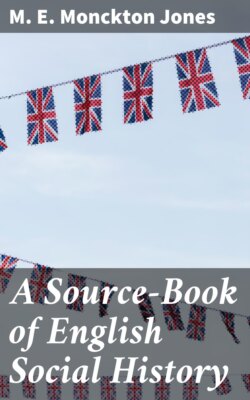Читать книгу A Source-Book of English Social History - M. E. Monckton Jones - Страница 3
На сайте Литреса книга снята с продажи.
PREFACE
ОглавлениеTable of Contents
The new scientific method of teaching history requires that the student should learn to examine some at least of the evidence for himself, and to form a judgment upon it: he is no longer expected to accept the teacher’s statements without discussion. Material for examination is, however, usually in the inaccessible form of ancient records, Latin chronicles, and so forth. It is the part of source-books to provide extracts from such records which may serve as laboratory specimens for analysis. They have the further aim of painting scenes vivid with local colour and live with the expressions of the actors themselves, so making the dry bones of the text-book put on flesh and reality.
This volume contains illustrations of various stages in the economic and social life of the British people from Saxon days to the Industrial Revolution. Fragments of the Saxon laws show the give and take of community life working out into rules of fair play and justice. The influence of the Church in trade, in education, in exploration and over-seas intercourse, appears in the life of Ingulf of Croyland. Town life is seen to develop through gild regulations and the records of London. The consequent growth of the burghers’ power in Parliament, in naval organization and in finance over against the power of great noble houses, and the disorder of the fifteenth century, emerge from the Paston Correspondence. Parliamentary Rolls, and the accounts of London’s growth. From manorial regulations, notes of wages at different periods, and contemporaries’ accounts of enclosures, the great changes in rural life are shown; while the explorations of Carpini and Marco Polo in the East and the Spaniards’ account of Drake’s piracy in the West indicate the change from the mediæval to the modern world. The growth of commerce as the controlling factor in politics is indicated by the letters of Sir Thomas Roe and the East India Company’s minutes, the writings of Defoe and Franklin; and Young’s tour hints at the state of England on the eve of the Industrial Revolution.
These extracts have, as far as possible, been taken from sources which the teacher can easily consult further on particular points, in the hope of promoting such study, without which the average teacher’s fountain of inspiration must soon run dry, to the withering of his pupil’s zeal.
For permission to borrow from their volumes I am greatly indebted to Sir W. Foster and Miss Sainsbury, Mr. S. C. Hill and Mr. Callender, also to the Hakluyt Society, the Royal Historical Society, the Oxford University Press, Mr. John Murray, and Messrs. Ginn & Co.
M. E. M. J.
February, 1922
